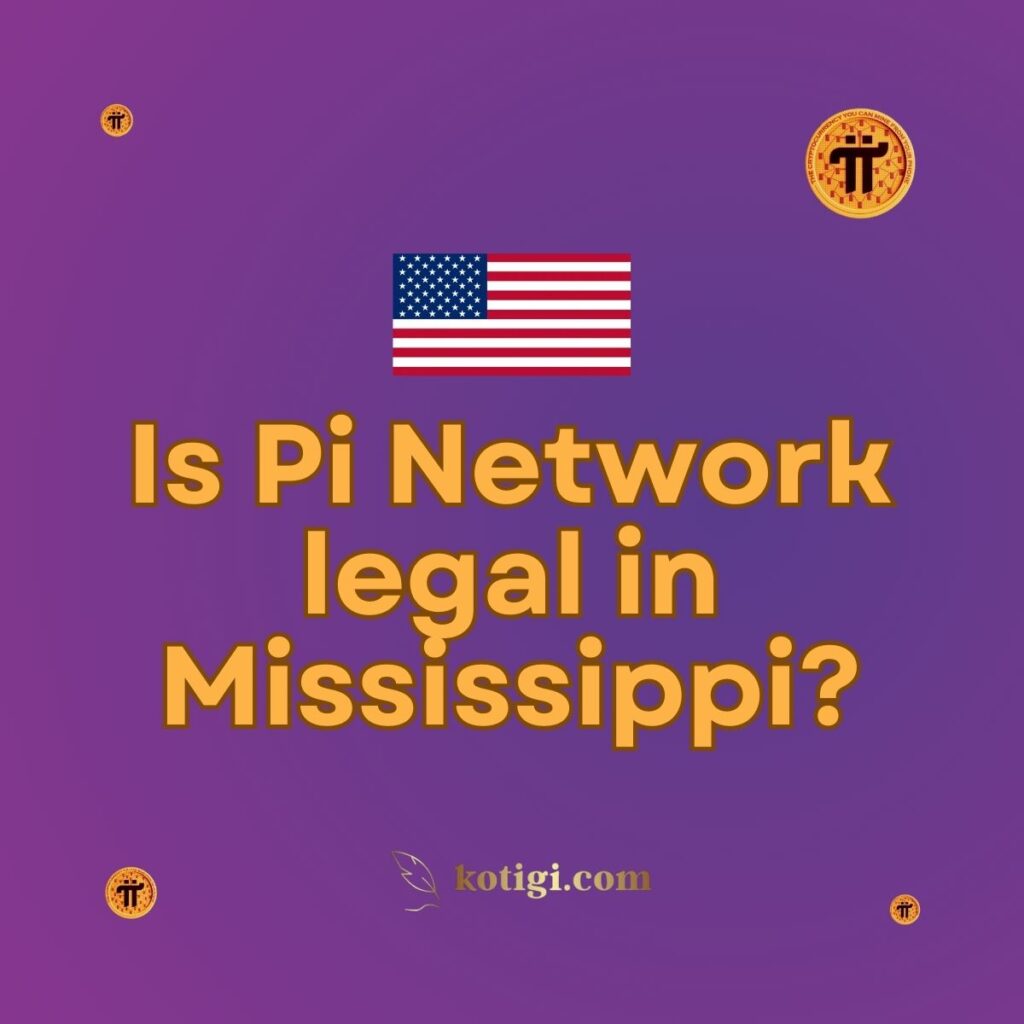
Is Pi Network legal in Mississippi?
Pi Network is legal in Mississippi, as there are no specific state laws prohibiting its use or participation. However, users should adhere to federal cryptocurrency regulations such as taxation and KYC compliance, ensuring full legal participation.
Introduction
As the world of cryptocurrency continues to evolve, individuals often find themselves asking the question of legality, especially when it comes to using platforms like Pi Network. Mississippi is no exception to this curiosity. Given its unique regulatory landscape, the legal status of Pi Network and other cryptocurrencies in the state is crucial for potential users and miners to understand. This article delves into the intricacies of cryptocurrency regulations in Mississippi, the status of Pi Network, and what users should be aware of moving forward.
Understanding Cryptocurrency Regulations in the U.S.
Federal Oversight on Cryptocurrencies
In the United States, the regulation of cryptocurrencies is primarily guided by federal laws. The Internal Revenue Service (IRS), the Securities and Exchange Commission (SEC), and the Financial Crimes Enforcement Network (FinCEN) are among the principal authorities that govern various aspects of cryptocurrency operations.
The IRS and Tax Implications
The IRS categorizes cryptocurrencies as property, which means that any profits made from their sale or trade are subject to capital gains taxes. This classification affects all states, including Mississippi, requiring residents who mine or trade cryptocurrencies like Pi Network tokens to report their earnings during tax season. Users must be diligent in maintaining accurate records of transactions and understanding their tax obligations.
SEC Regulations on Securities
The SEC’s mandate is to protect investors and maintain fair, orderly, and efficient markets. While Pi Network tokens are currently not classified as securities, it is essential for users to stay informed about any potential shifts in regulatory stances, especially if the tokens become tradeable on exchanges.
Compliance with AML and KYC
Both federal and state authorities have emphasized the need for Know Your Customer (KYC) and Anti-Money Laundering (AML) measures in the cryptocurrency space. Pi Network implements these measures, requiring users to verify their identities before they can fully engage with the platform. This compliance is critical in preventing fraudulent activities and promoting a secure environment for all users.
Cryptocurrency Regulations in Mississippi
The State’s Legal Framework for Cryptocurrencies
Mississippi does not have specific laws governing cryptocurrencies, which makes it a relatively open environment for users of digital currencies. Unlike states with stringent regulations, such as New York, Mississippi offers a more favorable landscape for cryptocurrency enthusiasts.
Current Lack of Specific Legislation
As of now, Mississippi has not enacted legislation specifically addressing cryptocurrencies. This absence means that residents can engage in activities like mining and trading without facing immediate legal consequences from state authorities.
Comparison to States with Stricter Regulations
To understand the significance of Mississippi’s regulatory environment, it is helpful to compare it with states like New York or California, where cryptocurrency businesses face strict regulations, including obtaining licenses. In Mississippi, users are not burdened by such requirements, allowing for more freedom in their cryptocurrency endeavors.
Impact of Federal Regulations
While Mississippi does not impose additional regulations, residents are still subject to federal laws. This dual-layer regulatory structure means that users must remain compliant with IRS reporting requirements and KYC regulations, despite the state’s more lenient stance.
Legal Aspects of Using Pi Network in Mississippi
Overview of Pi Network
Pi Network aims to make cryptocurrency mining accessible to everyone through its mobile app. The platform allows users to mine Pi tokens on their smartphones without the need for expensive hardware, making it appealing for a broader audience.
The Decentralized Nature of Pi Network
Pi Network is built on a decentralized model, allowing users to contribute to the network by validating transactions and securing the platform. This decentralized structure is beneficial in a regulatory sense, as it reduces the risk of single points of failure or regulatory capture by any one entity.
Mining and Earning Tokens
In Mississippi, individuals can participate in Pi Network mining simply by downloading the app and following the instructions. The user-friendly interface allows newcomers to easily join the network, and the lack of state regulations means they can do so without needing special permissions or licenses.
Compliance and Legal Responsibilities
Federal Tax Compliance for Pi Network Users
All cryptocurrency transactions, including those involving Pi tokens, are subject to taxation. Pi Network users in Mississippi must accurately report their earnings and any transactions that occur within the app.
Understanding Taxable Events
Taxable events include selling or trading tokens, converting them into fiat currency, or using them for purchases. Users should consult with tax professionals to ensure they are compliant with federal tax laws and avoid potential penalties.
KYC and AML Regulations
While Mississippi does not impose specific state-level KYC requirements, Pi Network’s adherence to KYC protocols means users must verify their identities. This process helps mitigate risks associated with money laundering and fraud, aligning with federal AML standards.
Implications for Users
Users in Mississippi must complete KYC verification to fully utilize Pi Network’s features. This requirement may seem cumbersome, but it ultimately protects users and the integrity of the network.
Potential Risks and Challenges
Security Concerns in Cryptocurrency
While Pi Network is legal in Mississippi, users must remain vigilant against security threats. Cryptocurrency platforms can be targeted by hackers, leading to potential loss of funds or personal information.
Protecting Personal Data
Users should employ strong passwords, enable two-factor authentication, and be cautious of phishing attempts to protect their accounts. Pi Network has made strides to secure its platform, but individual responsibility is paramount.
Legal Ambiguities
The evolving landscape of cryptocurrency regulation means that the legal status of Pi Network could change. While the current environment is favorable, potential future legislation could impact user activities.
Monitoring Regulatory Changes
Mississippi residents should stay informed about potential changes in cryptocurrency regulation. Following local news and updates from cryptocurrency advocacy groups can help users remain compliant and aware of their rights.
Community and Support in Mississippi
Engaging with the Local Cryptocurrency Community
Mississippi has a growing cryptocurrency community where users can share insights, ask questions, and support each other. Engaging with local groups can enhance the overall experience of using platforms like Pi Network.
Online Forums and Social Media
Various online forums and social media groups focus on cryptocurrency discussions. Platforms like Reddit and Discord host communities where users can seek advice and share experiences related to Pi Network and other cryptocurrencies.
Resources for Pi Network Users
Mississippi users can access numerous resources for navigating the complexities of cryptocurrency. Websites dedicated to cryptocurrency education can provide valuable information on best practices for mining, trading, and tax compliance.
Comparing Pi Network with Other Cryptocurrencies
Unique Features of Pi Network
Pi Network differentiates itself from other cryptocurrencies through its accessibility and focus on community building. Unlike Bitcoin, which requires significant computational power for mining, Pi Network allows users to mine through a mobile application, making it more inclusive.
User-Friendliness and Accessibility
The mobile-first approach of Pi Network caters to a broader audience, ensuring that even those without technical expertise can participate in cryptocurrency mining. This strategy has the potential to foster a larger user base compared to more traditional cryptocurrencies.
Examining Other Popular Cryptocurrencies
While Pi Network is gaining popularity, users should also consider other established cryptocurrencies like Bitcoin and Ethereum. Understanding the strengths and weaknesses of different platforms can help users make informed decisions regarding their cryptocurrency investments.
Future Prospects for Pi Network in Mississippi
Growth Potential of Pi Network
As the cryptocurrency space continues to evolve, Pi Network’s user-friendly model positions it well for future growth. The potential for increased adoption and usage could make Pi tokens more valuable over time.
Expanding User Base
With a focus on community engagement and accessibility, Pi Network has the potential to attract a diverse range of users. As more people become interested in cryptocurrencies, platforms like Pi Network could see exponential growth.
Regulatory Outlook
While the current regulatory environment is favorable, users must remain vigilant regarding future changes. Engaging with advocacy groups and staying informed about local legislation can help ensure that the interests of Pi Network users in Mississippi are represented.
Conclusion
Pi Network is legal in Mississippi, allowing residents to participate in mining and using Pi tokens without facing state-specific regulations. However, users must comply with federal guidelines, including tax reporting and KYC requirements. While the current environment is favorable, it is essential for users to remain informed about potential future regulatory changes that could impact their activities.
Key Takeaways
- Pi Network is legal in Mississippi due to the absence of specific state regulations governing cryptocurrencies.
- Users must comply with federal tax laws, including reporting cryptocurrency earnings to the IRS.
- KYC compliance is mandatory for all Pi Network users, ensuring a secure environment.
- Mississippi’s lack of stringent regulations allows for greater flexibility in cryptocurrency activities compared to other states.
- Users should stay updated on potential legislative changes that could affect cryptocurrency use in the state.




